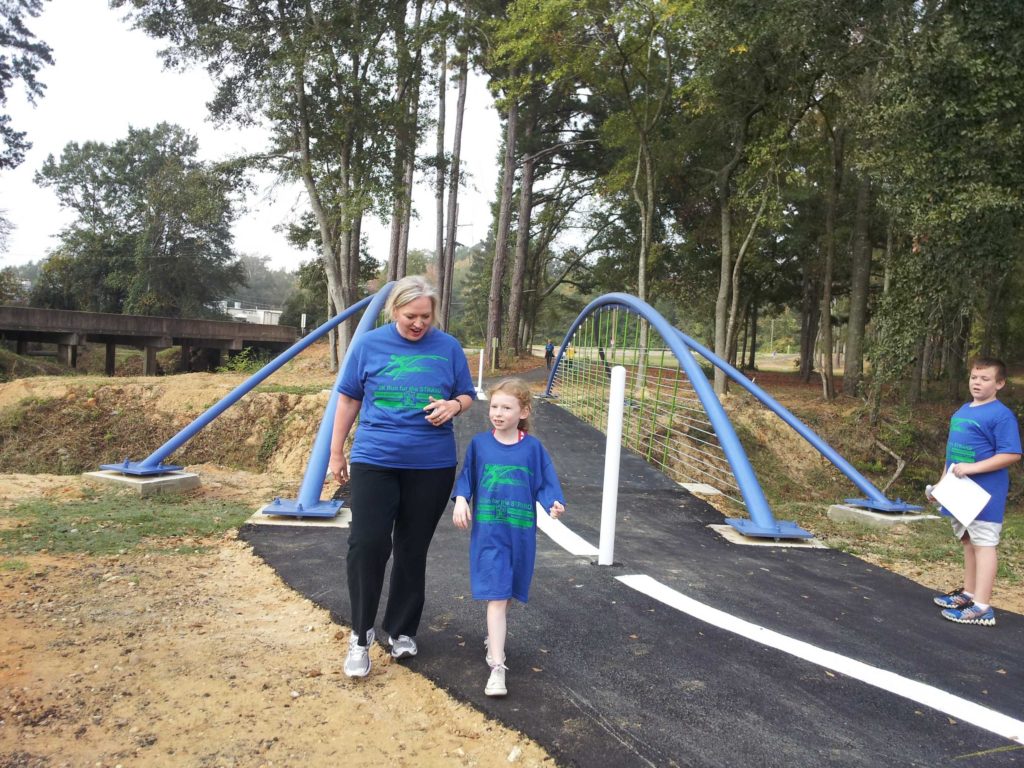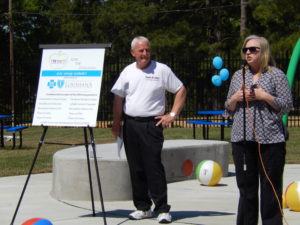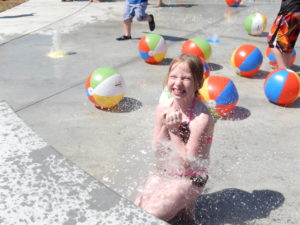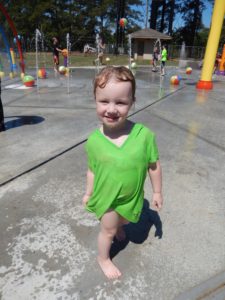By Tina Dirmann
BCBSLA Foundation Staff Writer
Most of us know our foundation’s executive director as a leader and passionate fighter within the landscape of corporate giving and corporate responsibility. But we also know Christy Reeves simply as a friend. So her parting at the end of December is bittersweet, even as we know she is moving on to expand her philanthropic know-how to folks within Louisiana’s borders and into the Gulf Coast. But before she goes, Reeves paused for a moment to give us her thoughts on the work we’ve accomplished in recent years, particularly through the bold multi-million dollar initiative she helped created, Challenge for a Healthier Louisiana. Her goal all along has been to, in her words, “move the needle” on Louisiana’s typically terrible health statistics. So we asked, are we there yet?
“Absolutely,” Reeves said confidently. “There’s no doubt we moved that needle. How that will play out in the long term? That’s hard to say. But I can’t help but believe there’s going to be a lot of positive momentum that will build around what we’ve started.
Q: How can you be so confident? Changing the attitudes of people long entrenched in unhealthy eating habits, especially those steeped in a cultural meaning, is extremely difficult.
A: It is. But I’ve traveled across the state for two years, nonstop, watching people who were not active before, now active. Watching people who were not eating healthy before, now eating healthy. So we have made a difference. I’m not sure what the numbers will say exactly. We won’t know that until Pennington finishes crunching the data. But we’ve sure changed thousands lives. And if that isn’t moving the needle, I don’t know what is.
Q: Your work helped pour $10.2 million into the state toward health and fitness initiatives, which then spurred matching funds from local governments and partner non-profits that totaled over $28 million. That’s an incredible success story. And the first round isn’t even finished, with another year to go before Challenge Grant is done. Do you feel like you are leaving work yet unfinished?
A: Actually, I don’t feel like I’m leaving it. I think it’s kind of like parenthood. You give birth to a child, give it all the resources to grow and make mistakes, and then you let that child go off and do their thing. Challenge Grant is like that for me. There’s a part of this child I’ve fallen in love with and will be part of me forever. But the truth is, the grantees haven’t needed me for a long time. They are out there changing the community on their own now. It’s been amazing to watch them grow in their capacity in just two years. In that short time, their conversations have become more sophisticated. They’ve developed standing programs and new springboard programs from people inspired by what’s happening around them. They are navigating their own territories now.
Q: Working their own territories, yes, as well as working together to creating this state-wide network for healthy change.
A: Exactly. I think no one group can change the issues we have to deal with in society. With Challenge Grant, so much has been about getting an entire community behind something — not just the YMCA or the United Way. It has to be collaborative. I remember our first Challenge Grant meeting, we had them all give presentations about what they are going to do. And at the end of that meeting, I said, “You are part of a state-wide movement. You are going to be the experts people call for advice, to see how it’s done.” And now it’s happening. So, Challenge Grant has taught me how to think bigger. One person can make a change, but it takes lots of people involved to sustain it.
Q: It sounds like you’ve been changed by your work with the foundation and with the Challenge Grant project as much as you’ve helped create change?
A: Has it changed me? Oh, absolutely. As a funder, you have these visions of impact that rarely come to fruition. You want to be an innovative philanthropist and change the health of the state. But so often, we don’t get to see the actual impact you are longing for. And then, in this case, I am seeing that. I see articles about how we went from the country’s worst in obesity to number six. I think we’re part of that change. And how The Advocate used the phrase “food desert” 44 times in the past two years, versus two in the previous 20 years. I think at least some of that is because of our Fresh Beginnings initiative in Baton Rouge. We are changing the conversation. That’s inspiring.
Q: Inspiring in what way?
A: Well, it made me think, “What’s next for me? How can I have an impact on a greater scale?” It lit a fire in me to want to be able to do more. If I can help make this happen in the state of Louisiana, what else is possible? Then an opportunity comes before me to impact the entire Gulf Coast of the United States and, well, it’s hard to pass up a chance to have impact on that scale.
Q: And that led you to accept your new role with Single Stop USA. Briefly tell us about your new position and the work you’ll be doing there.
Q: Still, I know you’re passionate about BCBSLAF‘s work and it will be hard to say goodbye. There have been many good memories to carry with you. Can you share a moment from the past two years that really touched you? A moment that you’ll think about long after you’re gone and deep into your new mission?
A: You know what was a profound moment for me? When I attended Jena’s new splash park ribbon-cutting this past summer. I pulled in and saw this amazing new splash park, with kids running around, having so much fun, not even realizing they are exercising. And I got to take my kids. I thought, “My girls don’t know it, but they are watching the state change before their eyes!” But I know it. The Live Lively LaSalle team has been really passionate about getting me to their events. So I’ve watched them the whole way. I watched them put walking trails in and have seen people using the trails, even pulling out their phones to light the way so they can use them in the evenings. And then the new Splash Park was open. And it immediately brought to tears.
Q: Christy… You are tearing up, as you speak. Why did this moment touch you so?
A: Because the reality is, I know two years ago, people would not be walking those trails or playing in that park. This community didn’t have these things. And now they do. And I told my girls, “I helped do all these things. I helped change this community forever. And I love it.” I’m not sure if my kids understood what I meant just then. But for me, it was absolutely powerful. It’s a moment I will always remember.




